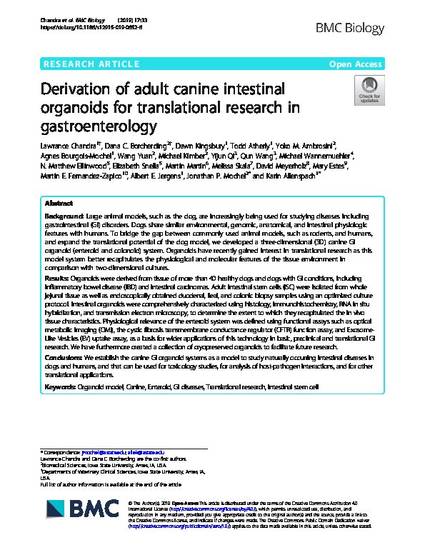
Background: Large animal models, such as the dog, are increasingly being used for studying diseases including gastrointestinal (GI) disorders. Dogs share similar environmental, genomic, anatomical, and intestinal physiologic features with humans. To bridge the gap between commonly used animal models, such as rodents, and humans, and expand the translational potential of the dog model, we developed a three-dimensional (3D) canine GI organoid (enteroid and colonoid) system. Organoids have recently gained interest in translational research as this model system better recapitulates the physiological and molecular features of the tissue environment in comparison with two-dimensional cultures.
Results: Organoids were derived from tissue of more than 40 healthy dogs and dogs with GI conditions, including inflammatory bowel disease (IBD) and intestinal carcinomas. Adult intestinal stem cells (ISC) were isolated from whole jejunal tissue as well as endoscopically obtained duodenal, ileal, and colonic biopsy samples using an optimized culture protocol. Intestinal organoids were comprehensively characterized using histology, immunohistochemistry, RNA in situ hybridization, and transmission electron microscopy, to determine the extent to which they recapitulated the in vivo tissue characteristics. Physiological relevance of the enteroid system was defined using functional assays such as optical metabolic imaging (OMI), the cystic fibrosis transmembrane conductance regulator (CFTR) function assay, and Exosome-Like Vesicles (EV) uptake assay, as a basis for wider applications of this technology in basic, preclinical and translational GI research. We have furthermore created a collection of cryopreserved organoids to facilitate future research.
Conclusions: We establish the canine GI organoid systems as a model to study naturally occurring intestinal diseases in dogs and humans, and that can be used for toxicology studies, for analysis of host-pathogen interactions, and for other translational applications.
Available at: http://works.bepress.com/jonathan-mochel/66/

This article is published as Chandra, Lawrance, Dana C. Borcherding, Dawn Kingsbury, Todd Atherly, Yoko M. Ambrosini, Agnes Bourgois-Mochel, Wang Yuan, Michael Kimber, Yijun Qi, Qun Wang, Michael Wannemuehler, N. Matthew Ellinwood, Elizabeth Snella, Martin Martin, Melissa Skala, David Meyerholz, Mary Estes, Martin E. Fernandez-Zapico, Albert E. Jergens, Jonathan P. Mochel, and Karin Allenspach. "Derivation of adult canine intestinal organoids for translational research in gastroenterology." BMC Biology 17 (2019): 33. DOI: 10.1186/s12915-019-0652-6. Posted with permission.